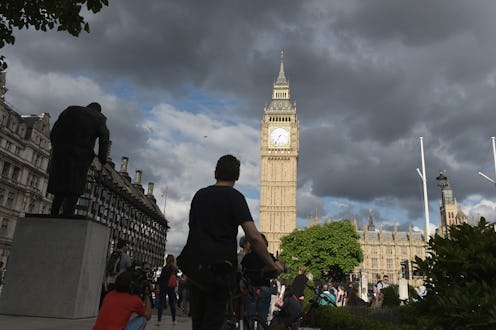News
Here's Why Britain Voted In Favor Of Brexit
After a shocking vote on Thursday to leave the European Union, the world is wondering what the next steps are for the United Kingdom. The nation as a whole was relatively split on whether or not to leave the EU, however, most voted in favor of leaving. Scotland, Northern Ireland, and London all voted to remain a member state, but the final 52-48 percent margin decided otherwise. When it comes down to it, why did the British people want to exit the EU?
There are multiple factors that led voters to the decision to leave, and some of this has to do with age, as well as ideology. For instance, people between the ages of 18 and 24 voted in favor of remaining a member state of the EU by 75 percent, compared to people over 65 who made up just 38 percent of the "remain" vote. An important reason behind the age gap in voting has to do with people entering the entry-level workforce. For instance, when the United Kingdom is a member state of the European Union, it also opens up the job market for young people to seek employment in 28 countries without having to apply for work visas.
But perhaps the most important issues to voters are immigration, the economy, and British sovereignty.
There are a few things that led the British people to vote against EU membership, and none can be separated from another. The issues of immigration, economics, and sovereignty inform each other. For those who voted in favor of leaving the EU, open borders means immigration, and high levels of immigration take away jobs, but also has an effect on the "British identity," as does EU membership. In fact, Euroscepticism and British nationalism have both, in some regard, informed the decision to leave.
Part of the economic question is the financial disaster in Greece, which many economists suggest is primarily due to the euro. While the United Kingdom never formally adopted the European currency, the decision to leave was tied into the idea that in order for the Union's financial system to work, for the distribution of wealth to states in need of extra support, there would need to be a more unified economic system, according to Vox. If the United Kingdom is not all in, then it should be all out.
Another aspect of this is the question of open borders that the EU allows. With people able to migrate easily between countries, some suggest that there are too many people entering the U.K. who are seeking employment. According to Vox, the U.K. received 333,000 new people in 2015 and one Brexit supporter, Douglas Murray, told the outlet, "In recent years, hundreds of thousands of Eastern Europeans have come to Britain to do a job."
On the other hand of immigration, there is the problem of a xenophobic and racialized rhetoric that has prompted U.K. conservatives to call for their national sovereignty. Andrew Lilico, an economist who spoke with Vox said, "There are nearly 130 Conservative MPs who have declared for leaving the EU."
With the influx of Syrian refugees entering European countries, some have used the fear of refugees and attacks across Europe as a reason for leaving. According to AJ+, the fear of refugees includes an increase in possible sexual assault but is also paired with the fear of Muslims. Of course, more refugees absolutely does not mean more sexual assault, and suggesting so is problematic.
But one journalist puts it very clearly. Vincent Bevins writes:
Both Brexit and Trumpism are the very, very, wrong answers to legitimate questions that urban elites have refused to ask for thirty years.
Questions such as - Who are the losers of globalization, and how can we spread the benefits to them and ease the transition? Is it fair that the rich can capture almost all the gains of open borders and trade, or should the process be more equitable? ... Immigration is good for the vast majority, but for the very small minority who see pressure on their wages, should we help them, or do they just get ignored? ...
... They have some legitimate concerns, and the only outlet to vent they were offered was a terrible one.
So, while the concerns of many in terms of economy, finances, immigration, and the distribution of wealth are valid and important, is such a nationalistic campaign as Brexit the way to address these institutional problems? And if Britain did it, is the United States next?
